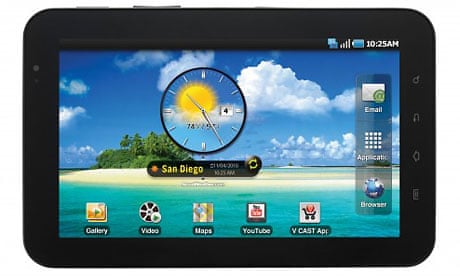An executive at Android tablet maker Lenovo claims that Samsung sold only 20,000 of the 1m tablets that it shipped last year as it tried to "buy share" from market leader Apple.
The dramatically low figure suggests that Samsung's efforts with its first 7-inch tablet, launched exactly a year ago, fell far short of targets.
Andrew Barrow, director of consumer products and pricing for Lenovo Western Europe, told the Guardian that the problem with trying to substantially undercut the price of the Apple iPad, of which around 30m have so far been sold, was that "any [manufacturer] would be giving money away."
Samsung said at the end of 2010 that it had shipped 1m of its 7-inch Galaxy devices, which were seen as the first real Android competitors to Apple's iPad. However, according to Barrow, Samsung only sold 20,000 of the tablets. Samsung had not returned a request for comment on Barrow's claim by the time of publication.
Samsung has never given details of the actual sales it has made in the tablet market. In an earnings call at the end of January, Samsung executives admitted that the company had shipped far more tablets than had actually been sold, saying that the latter figure was "quite smooth" – a puzzling phrase that was never explained.
Lenovo announced its own entry into the Android tablet market at the IFA technology show in Berlin on Thursday, with the IdeaPad K1. Asked whether the K1, which will launch in mid-September with a starting price of £349, should be much cheaper than the market-leading iPad 2, priced from £399, Barrow told The Guardian that "at that price, any [manufacturer] would be giving money away".
He added: "We don't feel the need to buy share from Apple. If the product sells, it sells." He said that Lenovo is being "tentative with [its] first volume", unlike certain other manufacturers. When pressed, Barrow said the Galaxy Tab "sold 20,000 out [of shops], and Samsung claimed a million shipments in [to shops]", thereby making a huge loss but becoming known as a major Android tablet manufacturer.
Rob Bamforth, a mobile analyst with Quocirca, told the Guardian that sales of 20,000 would be surprisingly low. "It's certainly plausible that sales into the channel are going to be significantly higher than sales out. The question is by how much, and that does sound like an awful lot," Bamforth said. "When you walk the streets and take the train you see iPads. Certainly the [Android] figures will be relatively poor. Whether they're that poor, I don't know."
Bamforth noted that if the claim was true, Samsung would have been engaging in an activity known as "channel stuffing", in which manufacturers can claim large shipments of products in order to rev up publicity. However, as resellers can generally return large amounts of stock if sales are particularly poor, manufacturers such as Samsung tend to have an incentive not to stuff the channel.
"These things tend not to emerge immediately, but if it was that bad three or six months in, you'd expect grumblings from various channel partners and I haven't seen significant grumblings," Bamforth said, adding that if sales were that low he would also expect to have seen more discounting of the device.
Since the original Galaxy Tab, Samsung has launched a series of successors in a variety of sizes. Its flagship model, the Galaxy Tab 10.1, has a similar screen size to that of the iPad 2 and is currently banned in Germany and Australia due to ongoing litigation with Apple. Apple claims Samsung has copied the look of the iPad in its Android tablets, along with certain elements of functionality.
Many manufacturers are now trying to sell Android tablets, and some recent iterations of such devices have become viable alternatives to the ubiquitous iPad. Samsung's new Galaxy Tab 7.7, a direct upgrade of the original, offers a faster processor than the iPad's, along with an impressive screen. The range of tablet-optimised Android apps has also grown significantly since the original Galaxy Tab launched at IFA 2010.
Barrow refused to say how big Lenovo's "tentative" first run of Android tablets actually was. Asked what would happen if it was not a hit, he said the company has "other products in the pipeline", with possible enhancements in terms of resolution, battery life, weight and size, as well as connectivity types.
Lenovo also has a business-oriented ThinkPad Tablet which is already available through IT suppliers across western Europe. That device is slightly pricier than the K1 due to its enterprise features, and is not being positioned a direct competitor to the iPad and the many consumer-oriented Android contenders.

Comments (…)
Sign in or create your Guardian account to join the discussion